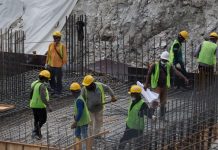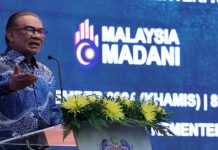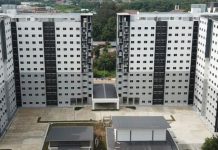Highlights:
- Australia sees further growth in trade, investments in Malaysia
- Singapore maintains 2018 GDP growth forecase at 2.5-3.5 per cent
- PayNow Corporate Launched in Singapore
- Heathrow Airport passport queues reached 2.5 hours in July
- 75 per cent of airports in Malaysia not commercially viable
- New book encourages family businesses to think like space travellers
Australia sees further growth in trade, investments in Malaysia
Australian High Commissioner to Malaysia, Andrew Goledzinowski said his country expects bilateral trade and investments in Malaysia to increase further from the current A$30 billion, as reforms put in place by the new government would continue to make the country an attractive investment destination. “The new Malaysia under Pakatan Harapan, particularly the Malaysia that is being developed through the reforms which is being brought forward under the advice of the Council of Eminent Persons (CEP) will make Malaysia an attractive investment destination,” he said. He told reporters this after a meeting with the CEP chaired by former Finance Minister Tun Daim Zainuddin in Kuala Lumpur. Goledzinowski said the 90-minute meeting covered issues such as education, health and finance matters. “Instead of discussing specific issues, we also have a dialogue on institutional reforms, which is an important aspect to ensure a transparent government. “For example, Australia had introduced a charter of budget of honesty which allows the public to have a better say on how the promises can be judged, particularly in the lead-up to election,” he said.
MTI Maintains 2018 GDP Growth Forecast at 2.5 to 3.5 per cent
Singapore’s Ministry of Trade and Industry announced today that the GDP growth forecast for 2018 is maintained at 2.5 to 3.5 per cent. The Singapore economy grew by 3.9 per cent on a year-on-year basis in the second quarter, easing from the 4.5 per cent growth in the previous quarter. On a quarter-on-quarter seasonally-adjusted annualised basis, the economy expanded at a slower pace of 0.6 per cent compared to the 2.2 per cent growth in the preceding quarter. The manufacturing sector grew by a robust 10.2 per cent year-on-year, extending the 10.8 per cent growth in the previous quarter. All clusters within the sector expanded, with the electronics, biomedical manufacturing and transport engineering clusters contributing the most to growth. On a quarter-on-quarter seasonally-adjusted annualised basis, the manufacturing sector grew by 1.8 per cent, slowing from the 26.2 per cent growth in the preceding quarter. MTI said, looking ahead, growth in several of Singapore’s key final demand markets is expected to moderate in the second half of the year as compared to the first half of the year.
PayNow Corporate Launched in Singapore
The Association of Banks in Singapore (ABS) has launched PayNow Corporate which is an extension of PayNow, the peer-to-peer instant funds transfer service that only requires one to know a payee’s mobile or NRIC number. PayNow Corporate will enable businesses, corporates and the government agencies to pay and receive Singapore Dollar funds instantaneously with the linking of their respective Unique Entity Number (UEN) to their Singapore bank account. PayNow Corporate is available to businesses, corporate and government agencies that are customers of seven participating banks – Citibank, DBS Bank/POSB, HSBC, Maybank, OCBC Bank, Standard Chartered Bank and UOB. With PayNow Corporate, retail customers of all the nine participating banks (seven banks mentioned above, plus Bank of China and ICBC) can now use PayNow for all their fund transfer needs, such as payments to business and receiving payments from government. With the nine participating banks, PayNow has access to the largest banking customer base for e-payments. To further enhance customer experience, the option of a QR code is also available to give businesses more channels to receive payments. This reduces the hassle of cash and cheques handling. Mrs Ong-Ang Ai Boon, Director of The Association of Banks in Singapore (ABS), said: “I am pleased that PayNow brings together a full of suite of funds transfer services among retail customers and between businesses and government agencies. ABS is encouraged that as at 10 August 2018, there have been more than 1.6 million PayNow registrations and over S$1.2 billion transferred via PayNow.”
Heathrow Airport passport queues reached 2.5 hours in July
Officials figure show that passengers arriving at London’s Heathrow Airport had to queue at passport control for up to two-and-a-half hours in July, The Border Force missed its 45-minute or less target for passport check wait times for 95 per cent of visitors from outside the European Economic Area (EEA) on all but one day last month, according to the data obtained by UK-based airline Virgin Atlantic. Queues were longest on Jul 6 when non-EEA visitors had to wait for up to two hours and 36 minutes at Heathrow, Europe’s busiest airport. Britain’s interior ministry, responsible for Border Force operations, said it was deploying 200 additional staff at Heathrow this summer, who would all be in place during peak travel periods in August and September. It said in a statement that it would not compromise on border checks and was working to reduce waiting times.
In Malaysia, Malaysia Airports Holding Bhd) said more than 75 per cent of airports in Malaysia are not commercially viable and are managed on a cross-subsidisation model to provide the Malaysian people with the required connectivity among its smaller towns and rural outposts. MAHB, which manages a network of 39 airports – five international airports, 16 domestic airports and 18 short-takeoff and landing (STOL) ports in Malaysia, said maintaining this network of airports involved a huge outlay of both capital and operational expenses. The airport operator said, in a statement, that it has been supporting the growth of airlines operating in Malaysia throughout the years with its low charges and incentive programmes. “In the case of low-cost airlines operating at our airports, over the last ten years this had amounted to more than RM1.5 billion market advantage through differentiated charges excluding the incentives”.
New book encourages family businesses to think like space travellers
What does going to the moon have to do with family business? Everything, according to veteran family business advisors Randel Carlock and Keng Fun Loh, the authors of a quirky new book, “A Family Business on the Moon”. The “fieldbook” presents frameworks and exercises that make each family using it a live case study in family business management and best practice planning as if they were planning a space venture. Carlock, the Berghmans Lhoist Chaired Professor in Entrepreneurial Leadership at INSEAD and Loh, Managing Partner at Family and Business Learning have constructed the book around the parallel planning process, a tried and tested formula they’ve used in their interactions with hundreds of family enterprises. The process helps families map out a plan to get to their destination that fits with their own family’s ambitions. It starts with determining the family’s values and vision, coming up with a business and a family strategy, determining human capital and financial capital investment and instituting family and business governance. “Planning for the future of a family business is a topic that’s difficult for families to deal with. Many believe that they should protect family harmony by avoiding difficult topics like succession, ownership or governance. The reality is just the opposite,” said Carlock. “We’ve seen many families with well-thought-out business plans and strategy end up in turmoil because the family side of family business has not been adequately planned for,” added Loh. Carlock and Loh hope families will be able to break down these difficult barriers to start the parallel planning process with stimulating visuals and interactive activities. “This book is designed so families can start the process of learning together on their own. Then they can reach out for additional help and we think that’s fundamental,” added Carlock.














